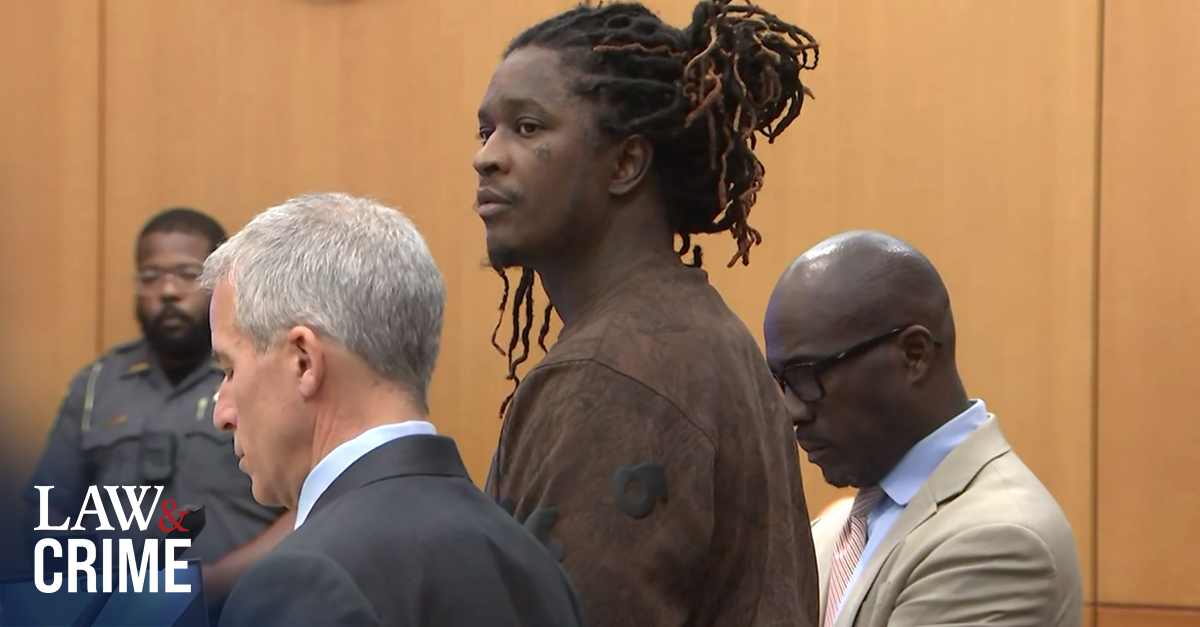
Jeffery “Young Thug” Williams changes his pleas in the YSL RICO trial on Oct. 31, 2024 (Law&Crime).
After almost 11 months of trial, nearly 10 months of jury selection, and some seven months of pretrial wrangling, the perpetually-disastrous racketeering (RICO) prosecution against Jeffery “Young Thug” Williams — and over a dozen other co-defendants — reached a whimpering end with a series of plea changes.
The longest trial in Peach State history largely flamed out on Oct. 23, when one of the state’s witnesses revealed that one of the defendants was either still, or had been, behind bars — because he was reading directly from an exhibit the state failed to redact.
In Georgia, jurors in criminal trials are not supposed to have such information.
As it turned out, this was the last of numerous times the state had slipped up in this fashion. Prosecutors allowed jurors to hear about at least two defendants having been incarcerated. One defense attorney quickly raised an objection and called for a mistrial. Then another. Then came a deluge of such requests from other defense teams.
“Now the jury has repeatedly heard about Mr. [Quamarvious] Nichols being in jail, being in prison, and we cannot unring that bell, so we will ask for a mistrial,” defense attorney Nicole Westmoreland said at one point. “It’s happening over and over again, your honor, and we’re not going to be able to unring 100 bells.”
Right in the midst of the contretemps, Fulton County Superior Court Judge Paige Whitaker expressed something not entirely unlike disdain for the effort put forth by the prosecution. Still, the judge said her motivation was to salvage the state’s case for them.
“What I’m trying to do is fix your sloppiness,” Whitaker told the prosecutors, the tenor of her voice rising. “So that everybody won’t have wasted, you know, 10, 12 months of their lives in this trial.”
Westmoreland pressed her advantage, arguing the state had “goaded” the defendants into asking for a mistrial. In instances where the prosecution is intentionally responsible for a mistrial, double jeopardy attaches and defendants cannot be retried.
The judge disagreed, saying co-lead prosecutor Simone Hylton appeared to be “appalled” when the witness revealed the verboten information. The upshot was clear: The court would not consider a mistrial with prejudice but was leaning toward a mistrial without prejudice — meaning the state would be able to refile charges and have another chance to prove their so-far-unproven allegations.
Wednesday ended with the call for a mistrial — just shy of the 50th such ask — unanswered, and with details of the plea deals being hashed out behind the closed doors of municipal offices.
Each individual defense team began meeting with Fulton County District Attorney Fani Willis and Chief Deputy District Attorney Adriane Love after the trial was cut short on Wednesday. Those meetings continued on until late Thursday morning. An expected resolution by Thursday afternoon did not pan out. Whitaker decided to call off the trial for the day as discussions continued.
The case shook out like this: Williams changed his pleas to a combination of guilty and no-contest — but did so with a non-negotiated plea because the defense and the prosecution could not come to an agreement about the terms of a prospective plea deal.
In court on Thursday, prosecutors explained that an offered plea deal would have allowed Williams to leave a free man — punished with time served and 15 years of probation. That deal would have also, however, hung a Damocletian sword of 23 years in prison above his head for violating the terms of potential probation.
Defense attorney Brian Steel confirmed the deal was rejected because the state asked for probationary terms the defense considered too onerous.
After those days of negotiations ended in a stalemate, the prosecution restated their case against Williams and the alleged YSL organization, at length. To that end, the state requested a sentence of 45 years — asking the judge to keep Williams behind bars for 25 years and on probation for 20 years after that.
Some plea deals were cut for other defendants.
In one case, however, all overtures to a quick resolution were rejected.
“Yak Gotti has rejected the State’s latest plea offer and fully intends to take this to the jury and get our not guilty verdicts and go home,” Douglas Weinstein, attorney for Deamonte Kendricks, said earlier on Thursday, in a statement.
Here’s how we got to this point.
On May 9, 2022, Williams was arrested on the strength of a sprawling 86-page indictment. That charging document has since been revised several times over.
In a marquee-worthy production by the DA’s office, the Young Slime Life crew was dubbed a criminal organization, or gang, and Williams himself was bestowed with the inauspicious honorific of “King Slime.”
At the height of the law enforcement dragnet, the district attorney claimed some 28 co-defendants. Procedural error, plea deals, and weeding out thinned these numbers substantially.
On the first day of jury selection, on Jan. 3, 2023, there were 21 co-defendants. Nine co-defendants would go on to take plea deals. Another 12 co-defendants had their cases severed from the overarching trial for various reasons.
Since the procedural shuffling, Williams and five others were left to face trial. In total, 18 alleged members of the purported “YSL” gang, which the defendants maintain is not actually a gang in the criminal sense, faced criminal charges.
Underscoring the level of drama in the long-running and ultimately aborted case is the fact that the judges in charge of the matter were replaced — twice.
In mid-July, Fulton County Superior Court Judge Rachel Krause decided recusal motions in favor of Williams and another defendant. She found that “preserving the public’s confidence in the judicial system” necessitated the removal of long-alleged-to-be-biased Fulton County Superior Court Chief Judge Ural D. Glanville.
Glanville, who had been in charge of the case since it came to court, waged an all-out fight to stay. And that battle was his undoing. In publicly trying to dispute the charges leveled against him in the recusal motions, the judge repeatedly violated long-standing judicial rules established by higher Peach State courts, Krause ruled.
The case was then reassigned to Fulton County Superior Court Judge Shukura L. Ingram, who has been a judge since 2015.
Two days later, on July 17, Ingram took herself off the job — out of an abundance of caution — because one of her deputies was arrested for allegedly conspiring with one of the original defendants in the case.
Having Whitaker take the case was the last of several attempts by the Fulton County criminal justice system to keep the prosecution afloat — and she denied various mistrial requests along the way, at one point even accusing the state of exceedingly poor lawyering.
In the end, the final judge lasted a little less than 3 1/2 months.
Have a tip we should know? [email protected]








